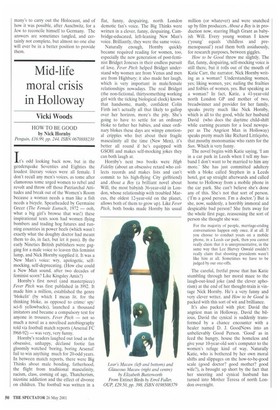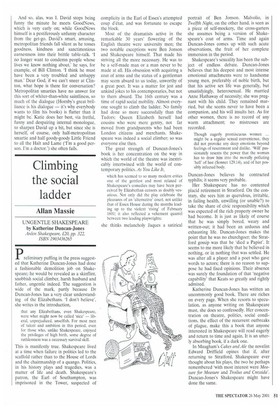Mid-life moral crisis in Holloway
Vicki Woods
HOW TO BE GOOD by Nick Hornby
Penguin, £16.99, pp. 244, ISBN 0670888230
It's odd looking back now, but in the genderquake Seventies and Eighties the loudest literary voices were all female. I don't recall any men's voices, as tome after clamorous tome urged women to rebel and revolt and throw off those Patriarchal Attitudes and break out of the Women's Room because a woman needs a man like a fish needs a bicycle. Spearheaded by Germaine Greer (The Female Eunuch, 1972 — ooh, what a big girl's browse that was!) these inspirational texts soon had women flying bombers and trading hog futures and running countries in power heels (which wasn't exactly what the doughty doctor had meant them to do, in fact, but let it pass). By the early Nineties British publishers were gagging for a male voice to leaven this feminist lump, and Nick Hornby supplied it. It was a New Man's voice: wry, apologetic, selfmocking, self-deprecating. (How else could a New Man sound, after two decades of feminist scorn? Like Kingsley Amis?)
Hornby's first novel (and masterpiece) Fever Pitch was first published in 1992. It made him a million, established the genre `blokelif (by which I mean lit. for the thinking bloke, as opposed to crime/ spy/ sci-fi yellowbacks), launched a thousand imitators and became a compulsory text for anyone in trousers. Fever Pitch — not so much a novel as a novelised autobiography told via football match reports (Arsenal FC 1968-92) — was very, very funny.
Hornby's readers laughed out loud as the obsessive, unhappy, déclassé footie fan gloomily watched 'boring, boring Arsenal' fail to win anything much for 20-odd years. In between match reports, there were Big • Thinks about male bonding, fatherhood, the flight from traditional masculinity, racism, class, coming of age, Thatcherism, nicotine addiction and the effect of divorce on children. The football was written in a flat, funny, despairing, north London demotic fan's voice. The Big Thinks were written in a clever, funny, despairing, Cambridge-educated, left-leaning New Man's voice. Brilliantly, they were the same voice.
Naturally enough, Hornby quickly became required reading for women, too, especially the new generation of post-ferninist Bridget Joneses in their endless pursuit of love. Fever Pitch helped Bridget understand why women are from Venus and men are from Highbury; it also made her laugh, which is very important in male/female relationships nowadays. The real Bridget (the non-fictional, thirtysomething working girl with the ticking biological clock) knows that handsome, manly, confident Cohn Firth isn't actually all that likely to gallop over her horizon, more's the pity. She's going to have to settle for an ordinary bloke to father her babies, and since ordinary blokes these days are wimpy emotional cripples who fret about their fragile masculinity all the time (New Men), it's better all round if he's equipped with GSOH and makes self-mocking jokes they can both laugh at.
Hornby's next two books were High Fidelity (about an obsessive retard who collects records and makes lists and can't commit to his high-flying City girlfriend) and About a Boy (a brilliant novel about Will, the most babyish 36-year-old in London, whose relationship with troubled Marcus, the oldest 12-year-old on the planet, allows both of them to grow up). Like Fever Pitch, both books made Hornby his usual million (or whatever) and were snatched up by film producers. About a Boy is in production now, starring Hugh Grant as babyish Will. Every young woman I know ('young' equals 'childless and premenopausal') read them both assiduously, for research purposes, between giggles.
How to be Good threw me slightly. The flat, funny, despairing, self-mocking voice is still there, but it rolls out of the mouth of Katie Carr, the narrator. Nick Hornby writing as a woman? Understanding women, yes; liking women, yes; nailing the frailties and foibles of women, yes. But speaking as a woman? In fact, Katie, a 41-year-old north London GP and mother of two, breadwinner and provider for her family, speaks pretty much like Nick Homby, which is all to the good, while her husband David (who does the daytime child-shift while earning peanuts for a local newspaper as The Angriest Man in Holloway) speaks pretty much like Richard Littlejohn, that mouthy monomaniac who rants for the Sun. Which is very funny.
The novel begins with Katie saying, 'I am in a car park in Leeds when I tell my husband I don't want to be married to him any more.' She has just committed adultery with a bloke called Stephen in a Leeds hotel, got up straight afterwards and called home to Holloway from a mobile phone in the car park. She can't believe she's done any of this. She's not that sort of person. (`I'm a good person. I'm a doctor.') But is she, now, suddenly, a horribly immoral and despicable bad person? She frets away for the whole first page, reassessing the sort of person she thought she was:
For the majority of people, marriage-ending conversations happen only once, if at all. If you choose to conduct yours on a mobile phone, in a Leeds car park, then you cannot really claim that it is unrepresentative, in the same way that Lee Harvey Oswald couldn't really claim that shooting presidents wasn't like him at all. Sometimes we have to be judged by our one-offs.
The careful, fretful prose that has Katie stumbling through her moral maze to the laugh-out-loud joke (and the clever aphorism) at the end of her thought-train is vintage Nick Hornby. He's a very funny and very clever writer, and How to be Good is packed with this sort of wit and brilliance.
It's also packed with plot: David the angriest man in Holloway, David the bilious, David the cynical is suddenly transformed by a chance encounter with a healer named D. J. GoodNews into an unbelievably Good Person. 'Good' as in feed the hungry, house the homeless and give your 10-year-old son's computer to the women's refuge kind of way. Naturally Katie, who is bothered by her own moral shifts and slippages on the how-to-be-good scale (good doctor? good mother? good wife?), is brought up short by the fact that her sneering and cynical husband has turned into Mother Teresa of north London overnight.
And so, alas, was I. David stops being funny the minute he meets GoodNews, which is very early on; while GoodNews himself is a pestiferously unfunny character from the get-go. David's smart, amusing, metropolitan friends fall silent as he tosses goodness, kindness and sanctimonious earnestness into their brittle table-talk. 'I no longer want to condemn people whose lives we know nothing about.' he says, for example, of Bill Clinton. 'I think he must have been a very troubled and unhappy man.' Dear God, if we can't sneer at Clinton, what hope is there for conversation? Metropolitan smarties have no answer for this sort of whiter-than-white saintliness, so much of the dialogue (Hornby's great brilliance is his dialogue — it's why everybody wants to film his books) is flatter than it might be: Katie does her best, via fretful, funny and despairing internal monologue, to sharpen David up a bit, but since she is herself, of course, only half-metropolitan smartie and half goody-goody Little Friend to all the Halt and Lame (I'm a good person. I'm a doctor.') she often fails.



















































































 Previous page
Previous page